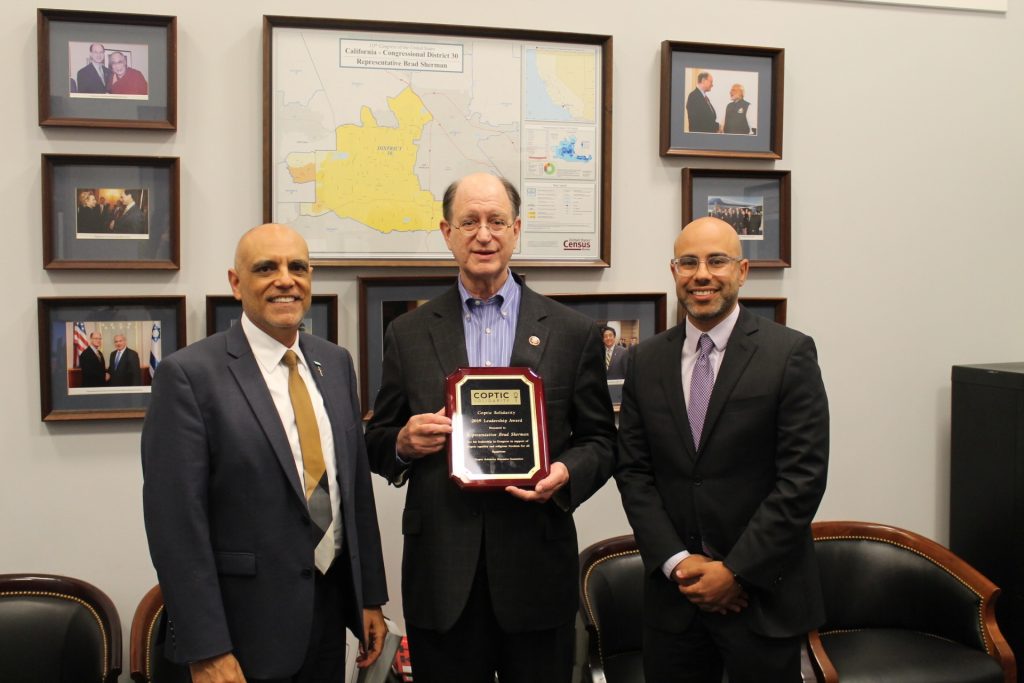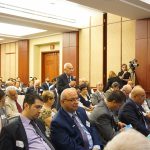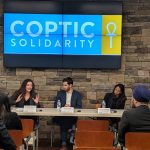Egypt’s Copts: Prospects of Equality in a Radicalized Society
View conference photo gallery>>
Coptic Solidarity hosted its 10th Annual Conference on June 20-21, 2019 in Washington, DC. The Theme, Egypt’s Copts: Prospects of Equality in a Radicalized Society, focused on recommendations to help Copts achieve equal citizenship rights and religious freedom in Egypt, as well as protection from violence and discrimination.
This year’s conference featured Sam Brownback, the Ambassador-at-Large for International Religious Freedom; Knox Thames, the Special Advisor for Religious Minorities in the Near East and South/Central Asia; US Rep. French Hill (R – AR), former congressmen Frank Wolf and Daniel Donovan; Mariam Ibraheem, a former prisoner of conscience from Sudan, Pastor Andrew Brunson, former prisoner of conscience in Turkey; and numerous other leaders from think tanks and non-profit organizations. In total, the conference featured 38 speakers who presented an array of perspectives and recommendations across the political spectrum.
Policy Day – National Press Club – June 20, 2019
President’s Introductory Remarks
Coptic Solidarity’s acting president, Ms. Caroline Doss, opened the conference with an analysis of the urgent situation Coptic Christians are now facing in Egypt. She commended the Egyptian government for their tolerant rhetoric but claimed that rhetoric has not translated into safety and protection in people’s everyday lives. She pointed to how security forces have repeatedly shut down churches because they would rather “prevent worship than protect churches.”
Panel 1: Reducing Institutionalized Discrimination in Egypt
Moderator: Ms. Nina Shea – Director, Center for Religious Freedom, Hudson Institute
Panelists:
Ms. Nadine Maenza: Commissioner, US Commission on International Religious Freedom
Dr. Elizabeth Prodromou: Associate Professor, Tufts University
Dr. Gabriel Sawma: Foreign Policy Adviser to President Trump
Panelists underscored the range of issues facing Coptic Christians, including attacks by ISIS, impunity of security forces, destruction of cultural and heritage sites, institutionalized religious discrimination such as unequal employment opportunities, and communal tensions especially in rural areas. Commissioner Maenza emphasized that religious discrimination does not just entail violence, but rather, it is pervasive, hiding in security forces, the committee on sectarianism, and religious reconciliation councils, amongst other facets in society. Gabriel Sawma delved into a thorough analysis of international law, offering it as a primary solution for the Coptic situation.
Knox Thames: Special Advisor for Religious Minorities in the Near East and South/Central Asia
“Protection of Coptic Christians, and all other faith groups at risk, is a primary concern of the State Department. In Egypt, malfeasants intend harm to Christians, their churches, and their property. ISIS declared Copts its favorite prey and its affiliates have carried out multiple large-scale murderous attacks on Copts – the latest one on buses carrying Christian pilgrims to a monastery in Minya last year. For these reasons and more, we continue to call on the government of Egypt to protect its Christians and their churches. However, protection is not the same thing as equality. Equality means equal rights for all citizens, and it is an appropriate theme to highlight during the conference. An Egypt where all have equal rights regardless of beliefs, and where all receive the equal protection of the law without any discrimination, will be a stronger Egypt and an even better strategic partner of the United States. Equality gives dignity and is deserved by everyone. It is not a gift to be given from the stronger to the weaker. The United States calls for equality, not just in Egypt, but around the world.”
Mariam Ibraheem: Human Rights Activist; Former Prisoner of Conscience from Sudan
“Unfortunately, Sudan is not an exception in the Muslim world. The application of Islamic Sharia law makes the segregation and persecution of religious minorities legally encouraged. It gives license [to people] like al-Bashir to oppress minorities and silence opposition.”
Panel 2: Egypt’s Cost for Radicalization of Society and Marginalization of Copts
Moderator: Dr. Mark Eid – Board Member, Coptic Solidarity
Panelists:
Ambassador Alberto Fernandez: President, Middle East Broadcasting Networks, Inc.
Mr. Bahey eldin Hassan: Director, Cairo Institute for Human Rights Studies
Dr. Sarah Yerkes: Fellow, Carnegie Endowment for International Peace
Dr. Eid began the panel stating that the epicenter of Egypt’s problems is the radicalization of society, and the panelists focused on different aspects of this issue. Ambassador Fernandez concentrated on the economic implications, arguing that though Sisi has been effective in improving the economy, it is difficult to sustain the economy in a climate of intolerance, radicalization, and terrorism. Dr.Yerkes focused, amongst other things, on how the issue of sectarianism is framed through the lens of terrorism, which is evident from the Committee on Sectarianism made up of security officials and counter-terrorism experts. And finally, Bahey eldin Hassan claimed that despite presenting himself as the protector of Copts, President Sisi has actually failed Copts in many ways, particularly from terrorist attacks.
Elliot Zweig: Deputy Director, MEMRI
Zweig noted the bitter reality that the Middle East, despite all its faults and violence, has previously been at times something of a refuge for ethnic and religious groups including for Jews fleeing persecution in Spain, and for Christians who had suffered under the persecution of the imperial church based in Constantinople. Yet, that situation has now deteriorated. “The past of the region cannot be romanticized, and intolerance, persecution, and violence existed within that world from the beginning…But the deeply ingrained pre-modern bigotry of the past has more recently been fused with the terrifying efficiency of the nation state and the speed and power of technology. The hope that existed, that the lands ruled by the Ottoman Empire in the 19th century, would evolve as the West did, even if slowly and painfully, but still steadily in that direction, has been dashed. So, we see the region become a renewed source of persecution and intolerance for it’s non-Muslim community from its earliest years.”
US Legislators
“Having more than 50 co-sponsors for this resolution [H.Res.49] from very diverse members of congress is nothing to discount, but there’s a lot more work to be done…I acknowledge and support our partnership and our friendship with Egypt, but more can always be done in the way and means of protecting religious freedoms and human rights. I continue to say that [President Sisi] does the right things at the top of Egypt as its leader…It’s critical that president Sisi’s words be backed by action.” ~ Congressman French Hill (R-AR)
“We’re talking about religious tolerance. I have a four-year-old daughter, I’m tolerant of her bad behavior. Practicing your religion is not bad behavior. We shouldn’t be tolerant of people practicing their religious beliefs. We should be respectful.” ~ Former Congressman Daniel Donovan
Panel 3: Collusion and Absence of Law Enforcement
Moderator: Professor Ryan Mauro – Director of the Clarion Intelligence Network and national security analyst for the Clarion Project
Panelists:
Dr. Patricia Karam: Regional Director, MENA; International Republican Institute
Dr. David Pollack: Bernstein Fellow, The Washington Institute
Kurt Werthmuller: Policy Analyst, U.S. Commission on International Religious Freedom
There was a general consensus by panelists that the collusion and absence of law enforcement is one of the biggest issues facing Copts, as well as other members of civil society. Werthmuller noted that while there have been a few incidents in which Egyptian security forces have prevented attacks against Copts, there have been many others in which they treated a situation with neglect, or even, participated in the violence themselves. This is part of a long history of the complex relationship between security forces and Copts, where security forces protect Copts, while also treating them as a security problem that needs to be dealt with. Dr. Karam stated that not only are the security forces oppressing Copts, but that they have also led a “campaign of intimidation, violence, and arrest against not just opponents, but civil society activists and critics.” Dr. Pollock concluded the panel by posing important arguments that must be grappled with seriously in order for the plight of Copts to improve. One of the questions revolves around the argument that the Coptic situation could be worse, and that an alternative is unknown.
Dr. Ashraf Sadek: Professor Emeritus of Egyptology and Coptology, Limoges University France; Founder, Le Monde Copte Review
Dr. Sadek began by reminding the audience that Copts “have played a very important part, both on a political and cultural level. We all remember the contributions, even in contemporary History, of famous Coptic personalities such as Iris Habib El Masri, Pahor Labib, Isaac Fanous, the Wissa Wassef family, Boutros Boutros Ghali etc.” Today, however, discrimination against Copts occurs in the realm of culture, where Coptic culture, identity and contributions to history are often erased and destroyed. Dr. Sadek proposed some solutions to counter this destruction of Coptic identity, primarily through countering the harmful rhetoric promoted through the media, and by registering Coptic properties as part of UNESCO world heritage sites.
Day Two – Key Bridge Marriott Hotel – June 21, 2019
Panel 1: Coptic Identity Revival: History, Education, Culture and Language
Moderator & Speaker: Dr. Ashraf Ramelah: President & Founder – Voice of the Copts
Panelists:
Dr. Fatin Moris-Gurguis: Professor, Polk State College
Dr. Ashraf Sadek: Professor Emeritus of Egyptology and Coptology, Limoges University France & Founder, Le Monde Copte Review
This panel involved a lively discussion on the possibilities of Coptic identity revival through history, education, culture, and language. Dr. Ramelah argued that the revival of Coptic identity is possible, but it is crucial that Copts take control of their own political representation and not leave it in the hands of the Coptic Orthodox Church. Dr. Moris-Gurguis highlighted that there are several aspects to Coptic identity. So, while Coptic faith is thriving both in Egypt and the diaspora, the Coptic language has survived in the Church but not colloquially, and both Dr. Sadek and Dr. Moris agreed that in order to ensure Coptic identity survival, Copts in Egypt and the diaspora ought to be rigorously educated about their own heritage and culture.
Former Congressman Frank Wolf
“It is time for you all to come together, with your Lebanese brothers and sisters in Christ, with your Iraqi brothers and sisters in Christ…With all the religious minorities. And also the Yezidis, who have suffered tremendous persecution. To come together, to have a conference, bringing together all the people in the United States and all the people around the world, to not just come and talk about how bad it is or what’s going on, but to put together a program, a plan of action of what you all will commit to do. One, two, three, four of what you will do to literally save Christianity in what I consider to be the cradle of Christendom.”
Tina Ramirez: President, Hardwired Global
“One of the positive things that’s happened in the last 10 or so years, and especially with what Coptic Solidarity has done, is that you’ve been able to coalesce a lot of the groups working on issues of religious freedom for Coptic Christians and the Christian community generally. So that when people come to Congressional offices, there’s one voice.” ~ Tina Ramirez
Lindsay Griffin: Director of Development & Advocacy, Coptic Solidarity
Ms. Griffin provided an overview of Coptic Solidarity’s work in the past year including key events such as the 9th Annual Conference, 3rd Modern Coptic Martyrs Day, participation in the 1st Ministerial to Promote Religious Freedom, and the updating and reintroduction of a resolution for Copts, H. RES. 49, in the US House of Representatives. She also highlighted two reports CS published, Discrimination Against Copts in Egyptian Sport Clubs and A Glimpse into the Mindset of Sheikh Ahmed al-tayeb, the Grand Imam of al-Azhar that are excellent new resources. Griffin concluded with observations on the similarity between the Coptic situation and pre-civil rights era US, noting important lessons Copts can learn from the work and success of Martin Luther King Jr. and other civil rights leaders.
Panel 2: Radical Islamic Institutions in Egypt: Can they be reformed?
Moderator & Speaker: Mr. Raymond Ibrahim – Author and Public Speaker
Panelists:
Brother Rachid: TV Anchor; Islamic theology scholar
Imam Mohammad Tawhidi
Panelists engaged in a lively discussion on the role of Islamic institutions globally and the possibility of reforming Islam. Raymond Ibrahim began the panel by focusing on CAIR and al-Azhar and discussed in detail how they are global exporters of radical ideologies. Imam Tawhidi detailed his personal story of living between Iran, Iraq and Australia, and how, after ISIS was founded, he became convinced to fight their terrorist ideology, through building a media platform, articulating a clear position on peace and tolerance, writing a book, and building a reformed following. Brother Rachid, a former Muslim, argued that Islamic institutions cannot be reformed, because Islam itself is flawed from its inception. He added that it is an impossible task to dismantle Islam entirely, and thus, it is important to keep Muslim countries in check by forcing them to abide by international law
Panel 3: Worldwide Persecution: Personal Testimonies
Moderator: Mr. Gary Lane – International News Director & Senior International Correspondent, CBN News
Panelists:
Dr. Darlington Akaiso: Educational Leadership Program, University of West Indies & Author
Pastor Dr. Faisal Daniel Babar: Anchor and Producer for Urdu Life Show
Ms. Mariam Ibraheem: Human rights activist; former prisoner of conscience in Sudan
Ms. Juliana Taimoorazy: Founding President, Iraqi Christian Relief Council & Senior Fellow, Philos Project
This panel placed the experiences of Copts within the global phenomenon of persecution against Christians, from Nigeria and Sudan to Iraq, Syria, and Pakistan. Mr. Lane initiated the panel with an overview of global Christian persecution. Ms. Ibraheem shared a powerful testimony of incarceration in Sudan. Pastor Faisal Daniel Babar described persecution against Christian women in Pakistan and Dr. Akaiso provided a detailed and thorough history of the foundation of Boko Haram. Lastly, Ms. Taimoorazy gave a nuanced account of the experiences of Christians in Iraq, urging the various Christian denominations to unite together as a unified Body of Christ to ensure their survival in the region.
Panel 4: Future of Coptic Advocacy: Intergenerational Perspectives
Moderator & Speaker: Ms. Caroline Doss – Acting President, Coptic
Solidarity
Panelists:
Mr. Samy Gerges: Senior Program Officer, Freedom House
Mr. Matthew Gundy: Political Science Student at University of California, San Diego
Dr. Nabil Mikhail: Faculty, George Washington University
The final panel of the conference was comprised of four Copts from different generations, discussing their perspectives and recommendations for the future of Coptic advocacy. Dr. Mikhail chronicled Coptic advocacy throughout history. Mr. Gerges urged Copts to have an internal dialogue, and to strengthen their relationship with the Church and with other human rights organizations. He argued this approach would improve techniques and achieve collective and unified goals. Mr. Gundy, the youngest panelist, emphasized the importance of utilizing all social media platforms to engage Coptic youth. He stated that diaspora Copts are suffering from a bystander effect, where they do not know how to effect change.
Gala Dinner Keynote Speaker: Pastor Andrew Brunson
Pastor Andrew Brunson recounted his story of incarceration in a Turkish prison. Brunson, who was an evangelical pastor of the small Izmir Resurrection Church, was arrested in 2016 in the wake of the coup d’etat attempt against President Erdogan. He also shared about his wife was initially incarcerated as well, for thirteen days. Upon release, she refused to leave the country because she was his primary source of support in Turkey. Brunson spoke of his emotional and spiritual transformation as he realized that his own suffering served the interest of Jesus. He acknowledged the widespread outpouring of support and prayer on his behalf, and recognized that others whose suffering is great often do not receive the same attention. He concluded his remarks with a message to Copts in Egypt, “continue to persevere.”
Brief remarks were also shared by the Ambassador-at-Large for International Religious Freedom, Sam Brownback, and the president of International Christian Concern, Jeff King.
===============================================================================
During the conference, Coptic Solidarity Executive Council members, Dr. Mark Eid and Dr. Michael Rizk, presented the Annual Leadership Award to Congressman Brad Sherman (D – CA)

Coptic Solidarity presented Heroes of the Faith Awards to Pastor Brunson, Ms. Mariam Ibraheem, and to Ms. Asia Bibi (whose award was accepted by Pastor Faisal Daniel Babar on her behalf.)
In celebration of Coptic Solidarity’s 10th Anniversary, Leadership Awards were presented to founding members of Coptic Solidarity who have donated and sacrificed of their time, talents, and resources to ensure the formation and continuation of Coptic Solidarity.
Awards were presented to:
Ms. Caroline Doss, Esq.
Dr. George Gurguis (in absentia)
Dr. Kamal Ibrahim
Mr. Atef Jacoub
Mr. Magdi Khalil
Mr. Armia Lawandy
Dr. Maher Rizkalla





